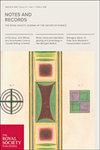What is a useful university? knowledge economies and higher education in late eighteenth-century Denmark and central Europe
IF 0.6
3区 哲学
Q3 HISTORY & PHILOSOPHY OF SCIENCE
Notes and Records-The Royal Society Journal of the History of Science
Pub Date : 2018-06-20
DOI:10.1098/rsnr.2018.0006
引用次数: 2
Abstract
Universities were an important site of Enlightenment improvement discourse and knowledge economies in the German-speaking lands and Scandinavia. Late eighteenth-century state building and scholars’ expectations of their own ‘usefulness’ regarding these processes were closely intertwined. The life and publications of the German-speaking Danish naturalist Johann Christian Fabricius (1745–1808) are used here to understand contemporary debates on the state of education, political economy and the development of the sciences in relation to ideas about economic and social progress. Fabricius was professor for ‘œconomics, cameral sciences and natural history’ at Kiel University for more than 30 years, from 1775 to 1808, and was one of the most outspoken writers on economic reform in Schleswig-Holstein and Denmark. Fabricius’ suggestions for improvement involved directly addressing social categories as well as the re-organization of universities in form and curricular content. Fabricius was engaged in debates on how to best achieve the specific knowledge and skills considered useful for the emerging nation-state. The essay analyses Fabricius’ interventions in these debates in the context of the contemporary development of the ‘research university’ around 1800.什么是有用的大学?知识经济和高等教育在18世纪晚期的丹麦和中欧
在德语区和斯堪的纳维亚半岛,大学是启蒙运动改善话语和知识经济的重要场所。十八世纪晚期的国家建设和学者们对这些过程的“有用性”的期望紧密交织在一起。德语丹麦博物学家Johann Christian Fabricius(1745–1808)的生平和出版物被用来理解当代关于教育状况、政治经济和科学发展与经济和社会进步思想的辩论。从1775年到1808年,法布里修斯在基尔大学担任了30多年的经济学、摄像学和自然史教授,是石勒苏益格-荷尔斯泰因和丹麦经济改革方面最直言不讳的作家之一。法布里修斯的改进建议包括直接解决社会类别问题,以及在形式和课程内容上对大学进行重组。法布里修斯参与了关于如何最好地获得被认为对新兴民族国家有用的特定知识和技能的辩论。本文以1800年前后“研究型大学”的当代发展为背景,分析了法布里修斯对这些争论的干预。
本文章由计算机程序翻译,如有差异,请以英文原文为准。
求助全文
约1分钟内获得全文
求助全文
来源期刊
CiteScore
1.50
自引率
0.00%
发文量
45
审稿时长
>12 weeks
期刊介绍:
Notes and Records is an international journal which publishes original research in the history of science, technology and medicine.
In addition to publishing peer-reviewed research articles in all areas of the history of science, technology and medicine, Notes and Records welcomes other forms of contribution including: research notes elucidating recent archival discoveries (in the collections of the Royal Society and elsewhere); news of research projects and online and other resources of interest to historians; essay reviews, on material relating primarily to the history of the Royal Society; and recollections or autobiographical accounts written by Fellows and others recording important moments in science from the recent past.

 求助内容:
求助内容: 应助结果提醒方式:
应助结果提醒方式:


